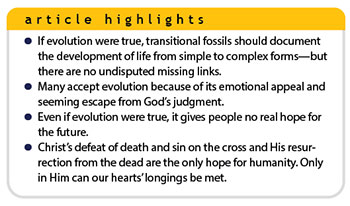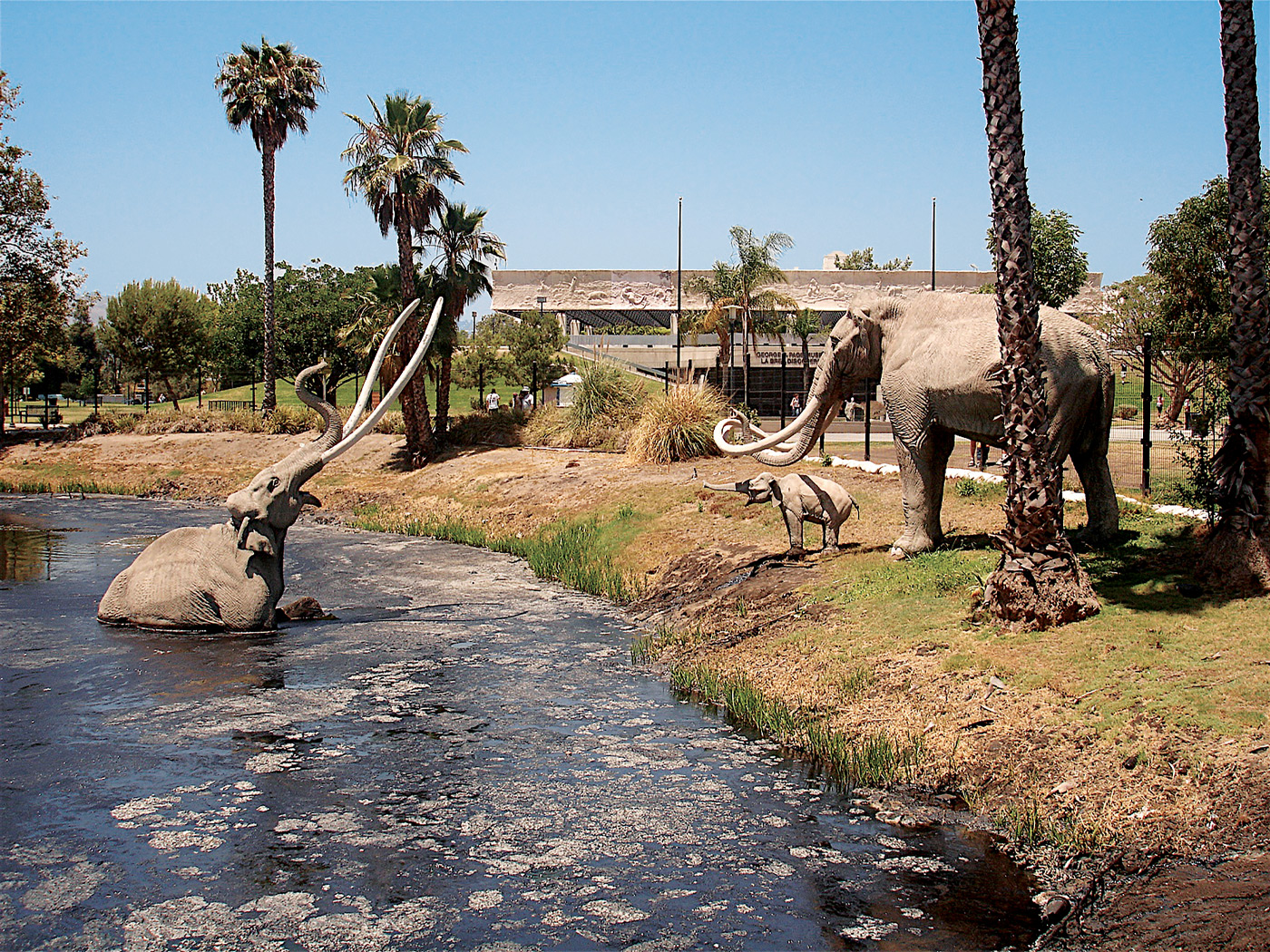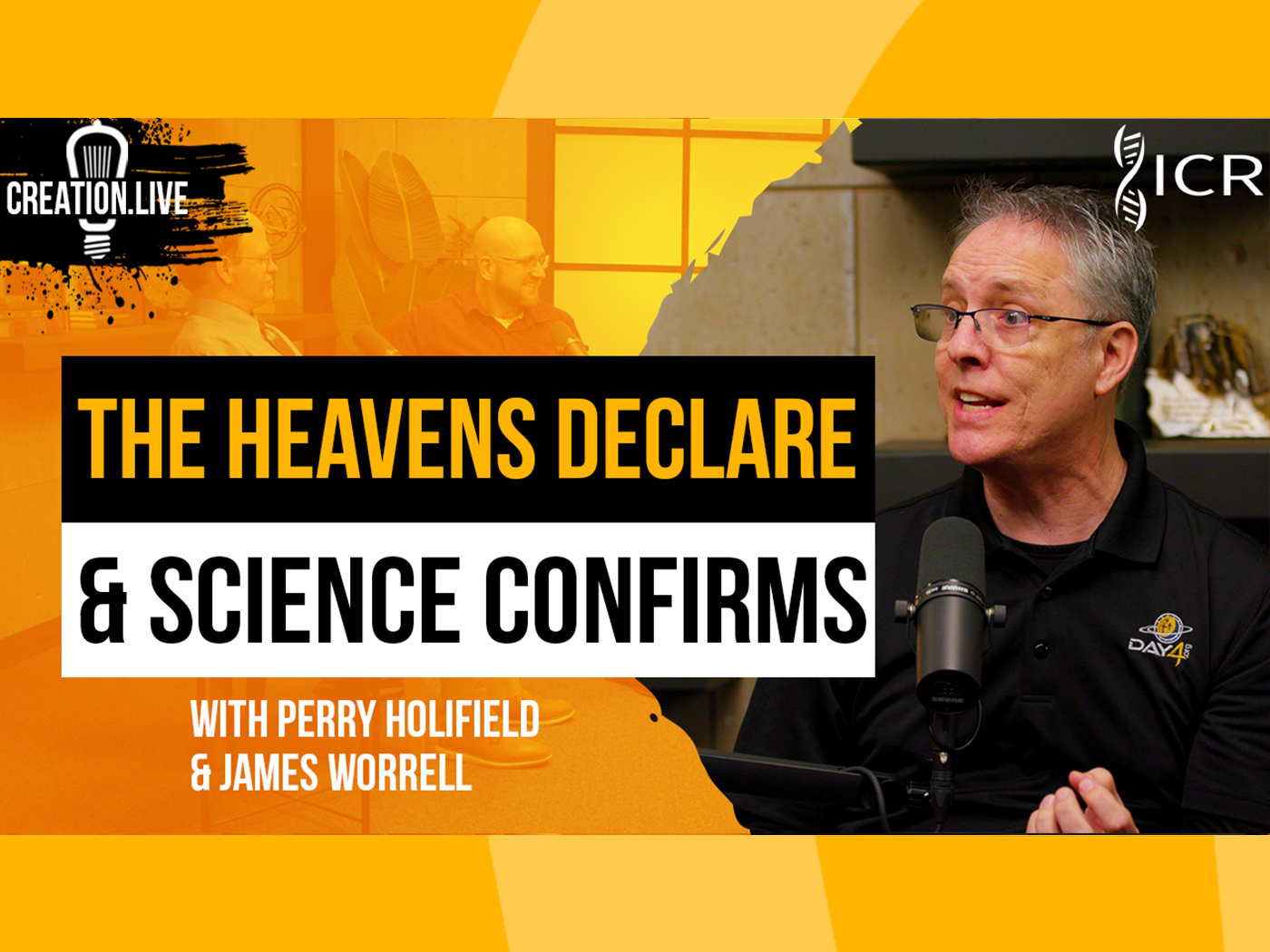 Scientific evidence for evolution is utterly lacking. Were evolution true, innumerable transitional fossil forms between basic kinds of creatures would clearly document the evolution of life from single-cell organisms to humans. Yet even among evolutionists there are no undisputed examples of these “missing links.”1 Moreover, the spontaneous emergence of life from nonlife has never been observed and seems absolutely prohibited by the laws of physics and chemistry. Despite intellectual pretensions to the contrary, people accept evolution not because of scientific evidence but because of its emotional appeal.
Scientific evidence for evolution is utterly lacking. Were evolution true, innumerable transitional fossil forms between basic kinds of creatures would clearly document the evolution of life from single-cell organisms to humans. Yet even among evolutionists there are no undisputed examples of these “missing links.”1 Moreover, the spontaneous emergence of life from nonlife has never been observed and seems absolutely prohibited by the laws of physics and chemistry. Despite intellectual pretensions to the contrary, people accept evolution not because of scientific evidence but because of its emotional appeal.
When one honestly reflects on one’s own sins and moral failures, the prospect of a future accounting to a supernatural Creator is terrifying. Even Darwin famously acknowledged in his autobiography that, for him, the doctrine of hell was a compelling reason to wish Christianity not to be true.2 But evolution supposedly removes the possibility of future judgment.
Also, evolution, at least as it’s popularly perceived, superficially holds hope for the future, with our descendants eventually becoming higher and better versions of us. Given enough time, our descendants will supposedly evolve into beings with, in the words of the old Adventures of Superman television show, “powers and abilities far beyond those of mortal men.” Such a possibility is admittedly appealing—no wonder this is such a common theme in comic books and science fiction movies!
Yet, even if our descendants were to evolve into superior beings, what hope does this offer those of us alive today? What hope does it offer to the billions who have already suffered and died before humanity could reach this better future? Moreover, the evolutionary story ends when the universe reaches a maximum state of disorder billions of years in the future. When this happens, our descendants will perish, regardless of any “more highly evolved” state they may have achieved.
What a contrast between the gospel of Christ and the unsupported fictional story of evolution. There’s zero evidence we humans are becoming better and better over time. But there’s abundant evidence we’re deteriorating mentally and physically, generation after generation,3 as taught by Scripture (Genesis 3; Romans 8:22-23).
However, because of the “many infallible proofs” of Christ’s resurrection from the dead (Acts 1:3), Christians can be confident that our sins are forgiven, giving us peace with God (Romans 5:1). We can also be confident that Christ will keep His promise to “upgrade” His followers with immortal, powerful, and glorious new bodies (1 Corinthians 15:42-44), bodies like His own supernatural resurrected body (Philippians 3:21). If one thinks about it, this is the only way we humans can ever realistically hope to rise to a higher, more exalted state. Performance can only be improved with a design upgrade from the Manufacturer, not by random mistakes in the production process!
Moreover, the sinful tendencies that estrange us from both God and others will be forever banished, and we will rejoice in the Lord’s presence for all eternity, with no more death, suffering, or pain (Revelation 21:4). And this blessed state will never be taken from us.
Creationists have spent much effort pointing out the scientific problems with evolution. But since belief in evolution is ultimately rooted in wishful thinking, not evidence, perhaps we should also work to show that the evolutionary story is emotionally unfulfilling as well. Only in the gospel of Christ can the deepest longings of the human heart be met.
References
- Morris, J. D. and F. J. Sherwin. 2011. The Fossil Record. Dallas, TX: Institute for Creation Research.
- Morris, H. M. 1994. Birthrights and Pottage. Acts & Facts. 23 (7).
- Sanford, J. C. 2008. Genetic Entropy and the Mystery of the Genome, 3rd ed. Waterloo, NY: FMS Publications.
* Dr. Hebert is Research Scientist at the Institute for Creation Research and earned his Ph.D. in physics from the University of Texas at Dallas.



















